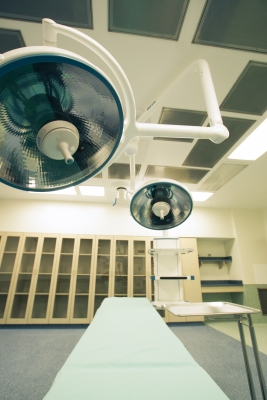The Centers for Medicare & Medicaid Services (CMS), an agency of the U.S. Department of Health and Human Services, published proposed rules this spring that would amend the fire safety standards for hospitals, long-term care facilities, ambulatory surgery centers, hospice inpatient, and many other healthcare facilities that participate in Medicare and Medicaid programs.
CMS proposed adopting the 2012 editions of the Life Safety Code, which includes measures devised by the National Fire Protection Association, and includes the Healthcare Facilities Code. A key change is a requirement that buildings over 75 feet tall have sprinkler systems throughout the structure. Existing buildings would have 12 years to install them.
Automatic sprinkler systems will be required in all habitable areas, closets, roofed porches, balconies, and decks of new residential health care facilities. CMS also strongly encouraged existing facilities to be sprinklered in all habitable areas. Under the new provisions, sprinklers also must be installed in attics of new and existing residential facilities if the attic is used for living purposes, storage, or the housing of fuel-fired equipment. Or, it must have a heat detection system, be of noncombustible construction, or be constructed of fire retardant treated-wood.
Newly-constructed facilities would have to install approved smoke alarms inside every sleeping room, outside every sleeping area, and on all levels within a residential unit. CMS is soliciting public comment regarding whether that requirement should be applied to existing facilities, as well.
(http://www.jdsupra.com/legalnews/new-federal-health-care-facility-regulat-93481/)
Related Stories
Codes and Standards | Feb 16, 2021
Feds may fund removal of some urban highways
Senate bill proposes pilot program to reknit communities.
Codes and Standards | Feb 16, 2021
Bechtel joins international heat resilience organization
Experience designing resilience standards to aid effort to protect communities from extreme heat.
Codes and Standards | Feb 10, 2021
More than two-thirds of construction companies say COVID-19 has not impacted their ESOP
Half of survey respondents say 2020 project profitability decreased due to pandemic.
Codes and Standards | Feb 9, 2021
New Jersey approves new electric vehicle-ready home requirement
Homebuyers must be given option for charging station on new construction.
Codes and Standards | Feb 9, 2021
New California law removes barriers to residential development
Measure removes restrictions for ADUs in urban areas and master planned communities.
Codes and Standards | Feb 8, 2021
Alliance yields more accurate data for rating and certifying systems of construction materials
Crosswalk API offers trusted format to specify and procure healthier products.
Codes and Standards | Feb 4, 2021
2021 IBC requires automatic doors for entrances to public buildings
One door must be either a full power-operated door or a low-energy power-operated door.
Codes and Standards | Feb 3, 2021
Two new International Code Council online code tools released
Offer detailed information about global building code usage and U.S. adoptions.
Codes and Standards | Feb 2, 2021
Biden tells OSHA to bolster COVID-19 safety rules
Order could lead to a national playbook for fighting COVID-19 on jobsites.
Codes and Standards | Feb 1, 2021
Fenestration Alliance updates standard for mulled combination assemblies
Last updated in 2010, document describes procedures and requirements for air leakage, water resistance, and structural performance.

















